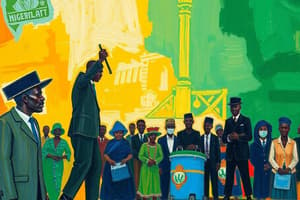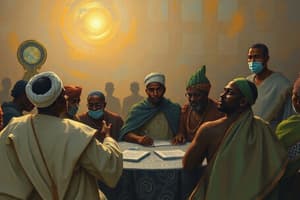Podcast
Questions and Answers
What is the primary role of the President in Nigeria's government?
What is the primary role of the President in Nigeria's government?
- To serve as the chief judge of the country
- To oversee international trade regulations
- To manage the country's banking system
- To act as the head of state, head of government, and chief executive (correct)
What triggers a runoff election in Nigeria's presidential elections?
What triggers a runoff election in Nigeria's presidential elections?
- If all candidates receive the same number of votes
- If no candidate receives 50% of the vote (correct)
- If the incumbent president is running for re-election
- If the election is deemed invalid
Which of the following best describes the economic structure of Nigeria?
Which of the following best describes the economic structure of Nigeria?
- A balanced economy with equal emphasis on agriculture and industry
- A primarily agricultural economy with minimal industrial activity
- A rentier state reliant on oil exports (correct)
- A technologically advanced economy focusing on digital services
Which religious group primarily dominates the northern region of Nigeria?
Which religious group primarily dominates the northern region of Nigeria?
What principle is designed to ease ethnic tension in Nigeria's government?
What principle is designed to ease ethnic tension in Nigeria's government?
What is the primary function of para-statals in Nigeria?
What is the primary function of para-statals in Nigeria?
Which of the following organizations is Nigeria a member of due to its oil exports?
Which of the following organizations is Nigeria a member of due to its oil exports?
What does the term 'Resource Curse' refer to in the context of Nigeria?
What does the term 'Resource Curse' refer to in the context of Nigeria?
Flashcards
Federalism
Federalism
A system of government where power is divided between a central government and regional governments.
Rentier State
Rentier State
A country that relies heavily on the export of oil or other natural resources for its revenue.
Presidential System
Presidential System
A system where the president is directly elected by the people and holds executive power.
Multiparty System
Multiparty System
Signup and view all the flashcards
Separation of Powers
Separation of Powers
Signup and view all the flashcards
Patron-Clientelism
Patron-Clientelism
Signup and view all the flashcards
Federal Character Principle
Federal Character Principle
Signup and view all the flashcards
Resource Curse
Resource Curse
Signup and view all the flashcards
Study Notes
Nigerian Government and Politics
- Transition from Authoritarian to Democratic: Nigeria transitioned from an authoritarian regime to a democratic one with a written constitution and regular elections.
- Federal System: A federal system divides power between the central government and state governments.
- Presidential System: Nigeria has a presidential system where a president is directly elected by popular vote and holds the head of state, head of government, and chief executive roles.
- Presidential Election Process: Candidates must achieve a majority (50%) of the national vote. If not, a runoff election occurs in which candidates need 25% of the national vote in two-thirds of the states. Elections are held every four years.
- Bicameral Legislature: Nigeria has a bicameral legislature consisting of a House of Representatives (lower house, elected via plurality) and a Senate (upper house, elected via plurality).
- Legal System: The country uses a common law system with judicial review powers. Sharia law is applied in 12 northern states.
- Multi-Party System: Operates within a multi-party system.
- Patron-Clientelism (Prebendalism): A system of political exchange where favors are exchanged for personal gain in jobs.
- Social Movements: Groups like the Movement for the Emancipation of the Niger Delta (MEND) and the Movement for the Survival of the Ogoni People (MOSOP) have emerged to address regional concerns.
Ethnic and Religious Divisions
- Ethnic Cleavages: Nigeria faces significant ethnic divisions.
- Religious Cleavages: North-South religious division exists with the north largely Muslim and the south largely Christian.
- Regional Cleavages: These existing fault lines include regional and economic divides arising from the uneven wealth distribution, with the oil-rich south frequently benefiting more compared to other parts of the country.
Economic Factors
- Rentier State: Nigeria relies heavily on oil exports for revenue.
- Resource Curse: Nigeria's focus on oil exports may have hindered the development of other sectors.
- Oil Wealth: While oil generates wealth, it also has potential negative consequences, such as an overly bloated public bureaucracy and corruption.
- State Corporatism and Para-Statals: Para-statals, privately owned but headed by government appointees, often contribute to the state's control rather than true public/private cooperation.
Foreign Policy
- Supranational Organizations: Nigeria participates in various international organizations including the African Union (AU), Economic Community of West African States (ECOWAS), the Organization of Petroleum Exporting Countries (OPEC), the United Nations (UN), and the World Trade Organization (WTO).
Additional Issues
- Boko Haram: The Boko Haram terrorist group presents a significant challenge for Nigeria.
- Federal Character Principle: A quota system aims to balance representation among the diverse ethnic groups.
Studying That Suits You
Use AI to generate personalized quizzes and flashcards to suit your learning preferences.




